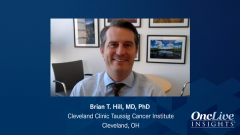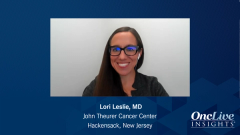
CAR T-cell Options for Patients with R/R FL
A focused discussion on available CAR T-cell therapies for patients with R/R FL, supporting efficacy data, and how these therapies have impacted the field.
Episodes in this series

Dr. Brian T. Hill: For follicular lymphoma, CAR-T cell therapy is an option in the relapse setting particularly for third line treatment. It has many similarities to stem cell transplant in that it typically requires referral to a transplant cellular therapy center. And it does require leukapheresis for a collection of T cells which is similar to the leukapheresis that's performed as part of autologous stem cell transplant. In contrast to allogeneic transplant, however, there is much more risk of long term morbidity from graft versus host disease, or other complications of immunosuppression that we see. So the package overall for CAR-T requires some amount of effort and investment. Possibly [00:18:00] an inpatient stay of up to two weeks or longer. But in many patients who are fit and not significantly advanced age, and retain performance status, this approach is highly effective. If we looked at the efficacy and safety data of CAR-T, we do have prospective trials from two different clinical trials. One is the ELARA trial is tisagenlecleucel. The other is the ZUMA five study of axicabtagene ciloleucel. And in both studies which use different CAR-T products, we see very high response rates in the 80 to 90% overall responses with the majority or at least half of those being complete remissions. There are important toxicity differences between axi-cel and tisa-cel. We typically see high rates of cytokine release syndrome with axi-cel, and higher rates of neurologic toxicity or ICANS. Despite this, most of these adverse events are reversible. And with modern treatment and experienced centers, supportive care is usually very effective at managing patients as they receive CAR-T cell for, with either of these products. So in terms of how these data may be changing the way that clinicians approach treatment selection and sequencing, I do think that's important for the community oncologists to be aware of CAR-T as a potential option as many patients with follicular lymphoma are treated in the community setting. If you're reaching for second or third line therapy, that's probably the time to at least pause and ask the question whether the patient would be a referral candidate. It doesn't always necessarily mean that they will get or need to get CAR-T or transplant. But at least asking the question whether they would be the candidate to be referred to a transplant cellular therapy center for that evaluation. And when we have these conversations with patients who are considering CAR-T, we try to be transparent about what's involved. There is again the inpatient stay in many cases, or the requirement to be near a treatment center, and the potential for toxicities. And I think as long as we're upfront about acknowledging these and only recommending going through with CAR-T in appropriately selected patients, I think that most patients who are referred for it agree to proceed.






































